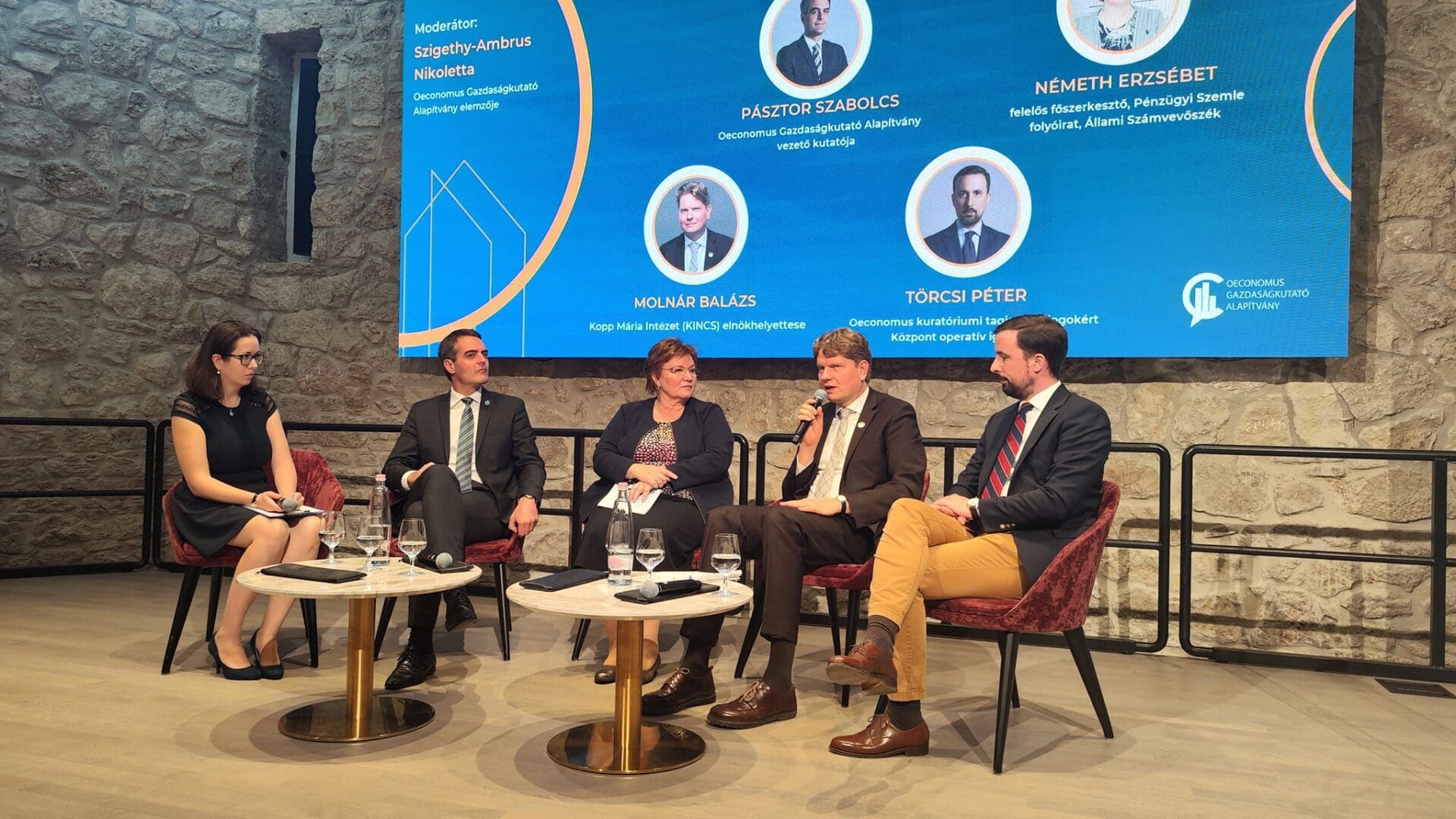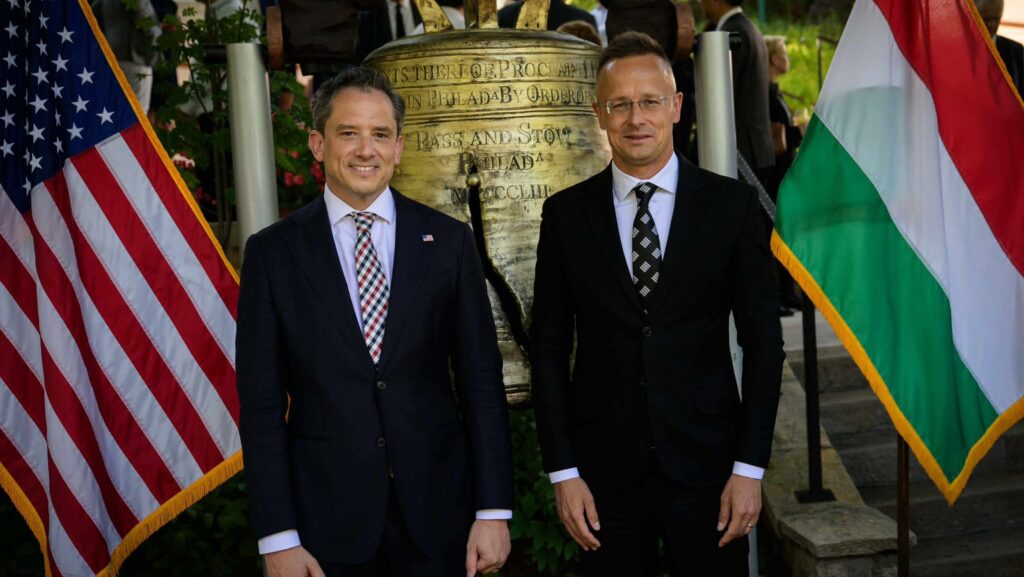On Monday morning, a conference organised by the Oeconomus Research Institute in Budapest celebrated and discussed the 110-year history of Hungarian family policies.
The conference was held in the beautiful Golden Bastion Restaurant located in the Buda Castle. At the beginning, the moderator reviewed and highlighted some important elements of the 110 years. It was also noted that the event was originally meant to include a discussion with the participation of opposition politicians, however, they did not accept the invitation. The event started with the opening remarks of Minister of Justice Judit Varga.
Families Are a Pillar of Society
Ms Varga started by explaining that she is a mother of three, so family policies affect her life directly. She stressed that she believes supporting families is a topic that is important and should always be discussed, by beeping strategic goals in mind. She stressed that the 110-year-old system is still a relevant topic to this day. The minister mentioned some important milestones from the past. In 1912, the first law on family allowances was introduced, so at the time of the time of the regime change, there were already models that could be emulated in terms of the rights of and laws to support those who have children. In 1995 the so called ‘Bokros package’ basically phased out most of the family policies in place, to be gradually reinstated from 1998, when the first Orbán government entered office. The four years of the Orbán government were followed by eight years of anti-family politics of left-wing administrations. With the return of Fidesz to power in 2010 the various policies supporting families were put in place again.
The government at the time made it clear that they were looking to introduce a new strategy and way of thinking, focusing on and investing in families and children, since they represent the future. Ms Varga said that as opposed to progressive liberalism, conservatives believe in communities, with families being a basic pillar of society. She also added that the appreciation of those who work is deeply connected to family policies. Regarding the policies in both of these fields the EU has proposed a policy package to be implemented by 2030. With its forward-looking family policies, the Hungarian government achieved those set goals as early as in 2021. Ms Varga said that she believes work is inseparable from family life. Employees’ performance is influenced by their emotional environment and sense of security. People are motivated to work primarily because they want to give their families the best life they can, she remarked.
She then added that with regard to the concrete policies, the current ones are practical, as opposed to what the left imagines. She explained that the current model revolves around jobs, not handouts. This means that the policies that support families are not based on the individual, but rather are closely connected to jobs. As examples, she mentioned the tax breaks for families and the fact that in 12 years the government has created one million new jobs in the country. She added that the goal is to make sure that anyone who wants to work is able to do so, and, what’s more, to leave most of their income in their pockets. She reiterated that those who work and have a family are the ones securing the future of Hungarian society.
The government annually spends about five per cent of the GDP on supporting families
She stated that deciding whether to commit oneself to having children is no longer an economic issue, on the contrary. The goal of the government is to make sure that if someone would want children, but cannot afford to, is supported. With its complex structure of family policies, the government annually spends about five per cent of the GDP on supporting families. This percentage is twice the average of EU countries. She added that the government also offers support to families that go through crises. There are laws and policies in place to support those who are going through a divorce, or children who need a new home for some reason, and those who are raising their children on their own. Ms Varga stressed that thanks to these complex policies, the fertility rate in Hungary rose from 1.2 per cent in 2010 to 1.6 per cent in 2021.

She underlined that the entire EU is struggling with a demographic challenge currently, and the Hungarian answer to that is investing in families. As a result of the policies, the number of marriages has doubled since 2010 and at the same time the number of divorces and abortions has substantially decreased. She also added that whenever she travels abroad for conferences, many politicians are interested in what Hungary is doing in terms of families. She said that it is not surprising that these are mostly right-wing politicians, who are aware of and appreciate the values of the Hungarian government and the Hungarian people. As Ms Varga put it: ‘God, country, and family. Hungarians respect, love and protect them.’ To close her statement, she quoted Kunó Klebersberg, who passed away 90 years ago this year. The famous minister of culture and education wrote in 1932: ‘We never needed the Hungarian traditional sobriety that stemmed from Ferenc Deák’s calm wisdom as much as now. We can come out of a worldwide crisis with little inner damage if the Hungarian nation manages to keep its incredible tranquillity: that whatever happens around us, we stay calm and collected.’ Ms Varga stated that Klebersberg’s words are still relevant today.
An Investment That Paid Off
After Judit Varga, Attila Beneda, Deputy Secretary of State for Family Affairs took the floor. In his presentation, which provided a historical overview of Hungarian family policies, he explained that the first law that was similar to contemporary family support policies was introduced when the House of Árpád had minders from abroad settle in the country. As it was one of the most dangerous jobs, families were ‘insured’ so that if something were to happen to a miner, they would not be left without any means. The other example he cited was from 1907, when a law was introduced that laid the foundations of what we today know as social security. He concluded that previous policies introduced in Hungary historically paved the way for those established by the current government and can be regarded as the organic foundations of where the country is today.
He added that the current regulations in place focus on predictability. To give an example, he highlighted that the ratio of state support of jobs on average rose from 24 to 80 per cent between 2010 and 2022.
Investing in family policies means investing in the economy as wel
He also pointed out that according to OECD statistics on how much of their GDP governments spend on families, Hungary was second among European countries already in 2017, with only France performing better. Mr Beneda added that investing in family policies means investing in the economy as well. Another important measure has been the creating of new day-care centres and improving the conditions in the existing ones all around the country, as it has meant that mothers are able to go back to work sooner after giving birth. Since 2010, Hungary has tripled the number of its day-care centres. He underlined that while employment is and has always been a tough question, as Ms Varga mentioned, the government helped create over a million new jobs in the last 12 years. He also highlighted that the employment rate of women has also grown, regardless of education levels, by 14.6 per cent. He concluded his remarks by reminding that helping families to acquire a home has also been an important item on the government’s agenda, as a result of which the building and buying of homes has also significantly grown in the past decade.
Choices Not Available Before
After the politicians’ remarks, the first panel discussion focused on the peculiarities of Hungarian family policies and compared them to those around the world. The discussed topics included what was referred to as a new paradigm emerging since 2010. The invited speakers, most of whom are parents themselves, recounted their personal experience regarding family policies before and after 2010. Ágnes Szuromi-Kovács explained that after her first children, she felt pressured and lost as she did not know if she should return to work as soon as she could or stay home with her kids. She said that one of the positive aspects of the current policies in Hungary is that women have a choice. They can either hurry back to work, or stay at home with their babies longer, and thankfully both choices are supported by the government. The other speakers agreed that there are more options for women and families now, as their support is one of the most important priorities of the government. The speakers also concurred that those countries that are trying to solve their demographic problems with migration are resorting to a temporary solution. In addition, by ‘importing’ people from countries that currently have no demographic issues, in the long run, they will cause problems in the source countries. The speakers described the negative consequences of migration as the ‘sticking plaster’ and noted that the sticking plaster needs to be removed eventually. They also agreed on the fact that the Hungarian solution is effective, not only in the country itself but in the surrounding countries as well. Demographic problems should be solved inside the country, not by bringing in people from the outside, the panelists concluded. To contrast that success, the example of China was brought up, where laws were first introduced that only permitted having one child per family but then were abolished as they resulted in a demographic crisis.
The panel was followed by a presentation by Jorge González-Gallarza and Jan Gregor, in which they discussed how Western European countries view Hungary from the perspective of family policies. Their conclusions coincided with those of the second panel, which focused on the demographic turnaround Hungary has experienced since 2010. Statements and statistics from the previous panel and presentations were frequently mentioned, and it was noted that demography is a complex question in every country that deserves complex answers and solutions. Hungary is definitely becoming a model for other nations and thanks to its family policies seems to be making progress rapidly, even if there is still a long way to go.
Family-Friendly Politics Are the Politics of Life
At the end of the conference, Fidesz communication director István Hollik made remarks. He highlighted that in the present turbulent times, anyone who is trying to start a family is faced with many challenges. The war in Ukraine, the energy crisis and the price of groceries are only one part of the problem. He said that he believes that the identity of young people is also being compromised in the world, thus, they find it harder to commit themselves to something as serious as starting a family.
He added that he believes that the circle of life is dependent on families and childbearing. As adults we commit ourselves and raise children, because ‘one of the most important parts of being human is continuing to give life to others.’ Therefore, Mr Hollik concluded, family-friendly politics are basically the politics of life.
Related Articles:








